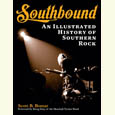Revisiting a Witch Hunt
Clay Risen’s Red Scare offers a fresh take on the legacy of Senator Joseph McCarthy
In the preface to Red Scare: Blacklists, McCarthyism, and the Making of Modern America, Clay Risen states his intention to resist “drawing parallels between the past and the present.”

In conversation, that resistance goes by the wayside quickly.
“I was struck this summer when [now Vice President] JD Vance was talking about these Haitian immigrants in Ohio who are supposedly eating pets,” said Nashville native Risen, an historian and editor at The New York Times. “When evidence was brought to show him that this is actually not true at all, he said, ‘Well, the truth of it doesn’t matter because sometimes we have to tell these stories in order to get a larger truth across.’ To me, that was exactly what McCarthy was doing.”
McCarthy is Senator Joseph McCarthy from Wisconsin, who used the threat of communist infiltration into American politics, entertainment, and elsewhere as a rocket ride to power in Washington, only to flame out when much of the threat was shown to be feverishly oversold.
Chapter 16 spoke with Risen in January. This interview has been edited for length and clarity.
Chapter 16: How much of a threat to America was spying by communists in the 1950s? Prior to that, Julius and Ethel Rosenberg had been executed for stealing secret nuclear bomb information and Alger Hiss was famously convicted of perjury involving spying. Those were serious security breaches, right?
Clay Risen: It’s wrong to say that there was no threat at all from Soviet espionage or that the American Communist Party was completely innocent of everything it was charged of doing. But I think most were relatively minor cases that should have been dealt with as law enforcement matters and counterintelligence matters. They certainly didn’t necessitate the overarching or overwhelming response from government and the private sector and the public. I don’t think that by 1948 or ‘47 there really was much of a national security threat. Look at what the Rosenbergs or Alger Hiss were accused of doing. Those are things that took place in the 1930s and ‘40s. That’s not to excuse away anything that they did, but to say what they did early on doesn’t justify the crackdown of the late 40s and 50s.
Chapter 16: McCarthy doesn’t come across as terribly intelligent in the book. Is that a correct assessment of him?
Risen: He was a useful tool for a lot of different groups because he was willing to say stuff they couldn’t. Senator Robert A. Taft, the Senate majority leader, he wasn’t about to get out there and say the sorts of things that McCarthy was. He had too much at stake to be casting wide aspersions, but it was very useful for him to have McCarthy out there doing it. People who wanted to protect their reputations could feed stuff to McCarthy, and McCarthy was willing to say it. He became a puppet for these folks, even though, obviously, I think he did have his own volition and his own ideas about where he was going.
Chapter 16: At least three presidents [Harry Truman, Dwight Eisenhower, Richard Nixon] and one presidential candidate, Robert F. Kennedy, had roles in the Red Scare. What did their actions reveal about them?
 Risen: Truman was a very capable leader, but [after the death of President Franklin D. Roosevelt) he was dropped in midstream to a lot of issues that even a year before he probably didn’t anticipate he’d have to deal with. Truman was not in over his head, but I think he was ultimately a little naïve. He had faith that the American public was too smart and had too much common sense to be drawn in by the far left and communism, or on the other hand, to be drawn into red baiting and the Red Scare. He seemed to have been caught quite flat-footed when it turned out there had been spies in the U.S. government. He was also caught flat-footed when the Republicans really ran on and beat down the Democrats with charges [about Communist infiltration].
Risen: Truman was a very capable leader, but [after the death of President Franklin D. Roosevelt) he was dropped in midstream to a lot of issues that even a year before he probably didn’t anticipate he’d have to deal with. Truman was not in over his head, but I think he was ultimately a little naïve. He had faith that the American public was too smart and had too much common sense to be drawn in by the far left and communism, or on the other hand, to be drawn into red baiting and the Red Scare. He seemed to have been caught quite flat-footed when it turned out there had been spies in the U.S. government. He was also caught flat-footed when the Republicans really ran on and beat down the Democrats with charges [about Communist infiltration].
Chapter 16: What about Nixon? It seems like he rode the wave of the Red Scare and ditched it when it didn’t suit him anymore. Did he have any true beliefs on the subject?
Risen: He started off as a centrist, very concerned about civil liberties and the potential for overreach. It was only when he saw that he could make a real splash that he dug in [on the Red Scare]. The takeaway is, ultimately, that he was an amoral opportunist when it came to this. It’s hard and probably pointless to dig out fundamental beliefs underneath, because everything was in service of Richard Nixon. I wouldn’t totally discount that if things had gone differently early in his political career, he could have ended up more of a New Dealer, because that’s what the moment called for.
Chapter 16: It was President Eisenhower who ultimately took McCarthy down. How did he do it?
Risen: Essentially, he created a compromise where he reinforced the establishment and pushed aside the far left and far right. That was very much 1950s consensus building. Eisenhower does stand to me personally as something of an admirable character for just ultimately having faith in the establishment and in the ultimate wisdom of moderation. That at least temporarily won the day, but there’s a case to be made that had he taken on McCarthy more aggressively, he could have done more to disabuse more people of these conspiracy theories and witch hunting.
Chapter 16: Robert F. Kennedy was in the thick of all this when he was on McCarthy’s staff during the Red Scare. He’s hardly mentioned in the book. Were you too easy on him?
Risen: You’ve got to pick your battle sometimes. You’re right that there’s a lot to be said. [Robert] Kennedy was such an opportunist early on. I think he, like his brother [John F. Kennedy], fundamentally believed in anti-communism and that Communists needed to be attacked in every way. But whether he agreed with what McCarthy was doing, I’m not sure. He was only there for a brief period, and the reasons why he left, he would say later, had to do with his disgust with McCarthy. There’s a lot to get in there that ultimately is, to some extent, to the side of the questions that I’m trying to get at. But there is probably a lot to be said about why this was not a profile in courage of Robert Kennedy.
Chapter 16: Is there any threat that we could face where you would support taking away civil liberties of Americans, which happened back then?
Risen: That’s a big question. I suppose there’s always a case that would necessitate something like that. During the Civil War, Lincoln took away habeas corpus rights in some cases, and I think I’d be hard pressed to argue he was wrong in doing that. There’s always a balance between civil liberties and national security. I’m not an absolutist in that sense, but I think with the Red Scare, it illustrates that it’s very easy, once excuses are offered, to make a case for taking away civil liberties. It’s very easy for that to steamroll into overreach on the part of governments at all levels.

Jim Patterson is a Nashville freelance writer whose work appears often on the United Methodist News website. He has been a reporter for The Associated Press in Nashville and senior writer and public affairs officer for Vanderbilt University.





